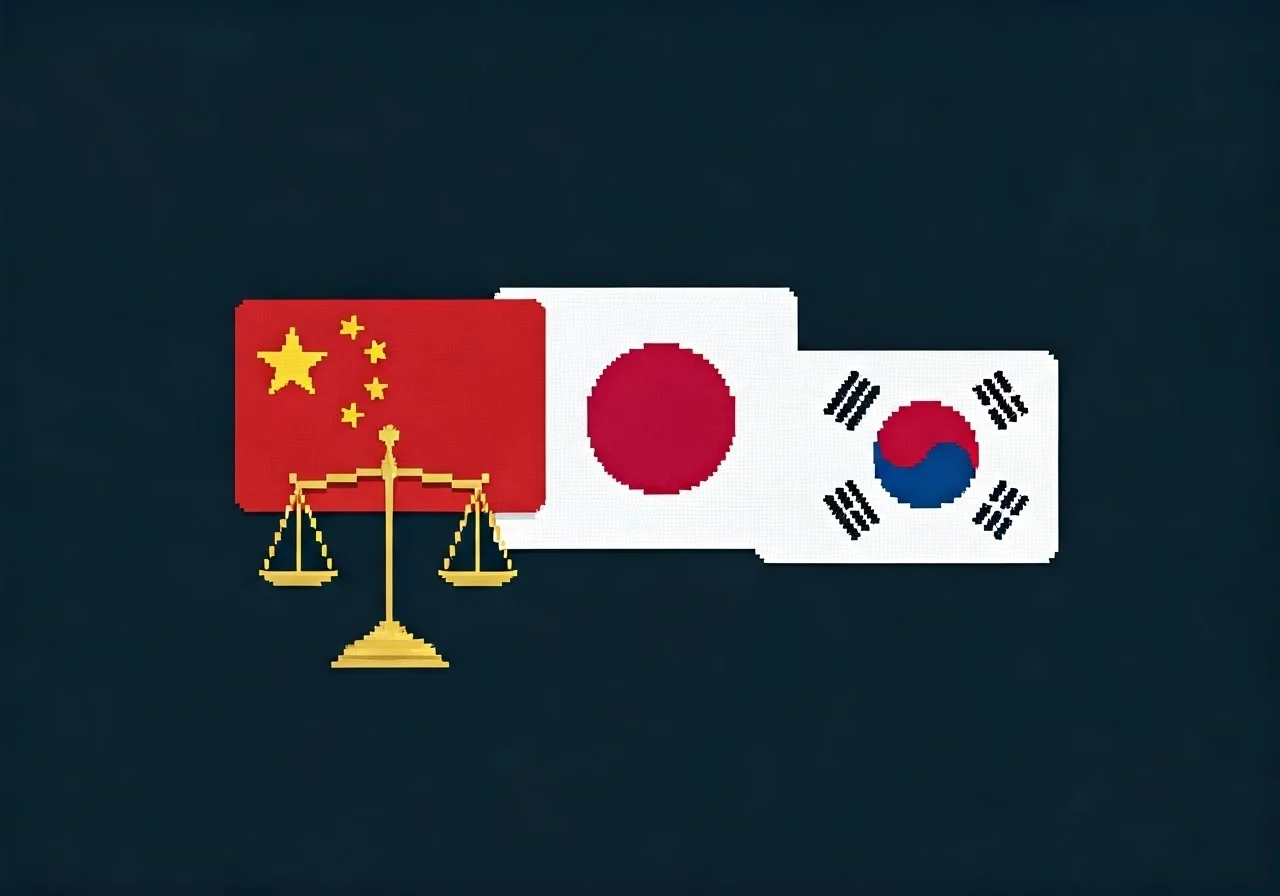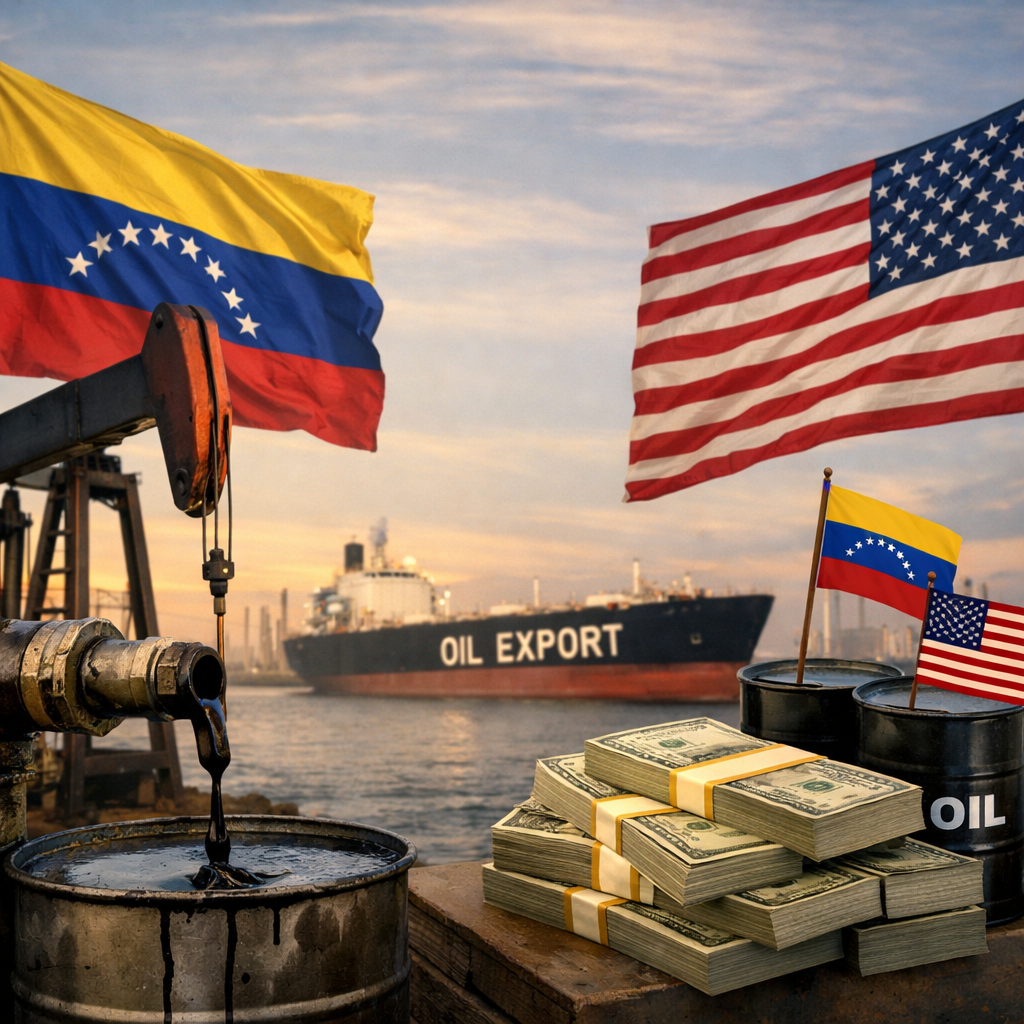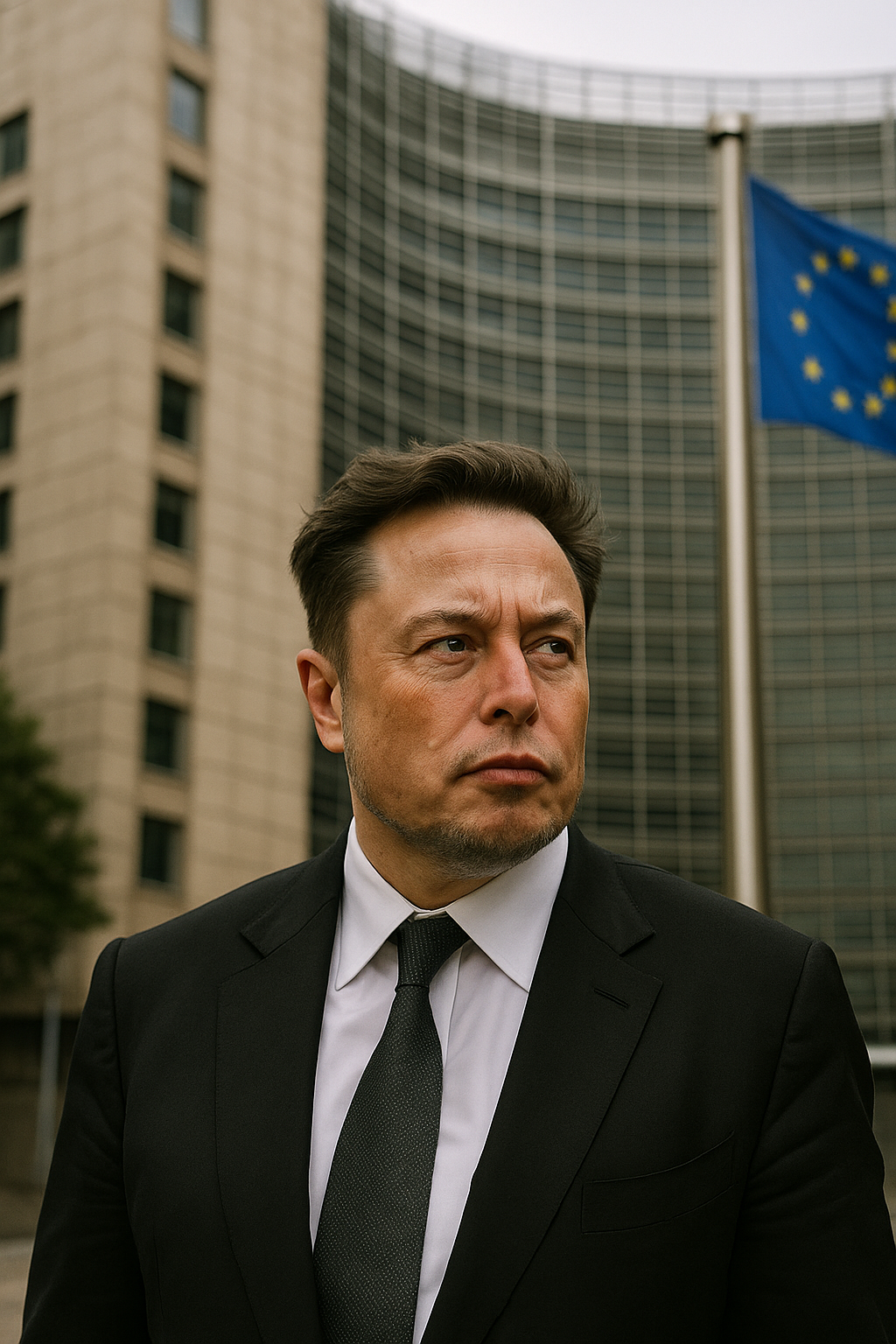Key Highlights
- In a unified stand against President Trump’s escalating trade war, China, Japan, and South Korea have announced joint retaliatory measures.
- Triggered by new tariffs on steel, aluminum, and a range of goods, this alliance signals a significant shift in global trade dynamics.
- Historical tensions between the three Asian nations appear to be sidelined in the face of a common economic threat.
- The implications of this unprecedented alliance extend beyond trade, potentially impacting diplomatic relations and global power structures.
- As businesses worldwide brace for impact, the long-term economic and political consequences of this emerging trade war remain uncertain.
Introduction
The world of international trade is changing as President Trump’s strong tariffs, including Trump’s tariffs against China, start a new time of trade wars. The impact of tariffs, especially those against China, can be felt all over the global market, influencing the balance of trade. In response, some unexpected countries, like China, Japan, and South Korea, quickly pushed back. This rising trade war has serious effects on businesses, shoppers, and countries’ relationships around the world.
Historical Context of Trade Tensions
 Trade tensions have been a problem between the United States and China for many years. The U.S. often says that China uses unfair trade practices. These include stealing ideas and tweaking currency values, which has caused a large trade deficit. The U.S. buys much more from China than it sells back to them. This issue has been a big deal for many U.S. leaders.
Trade tensions have been a problem between the United States and China for many years. The U.S. often says that China uses unfair trade practices. These include stealing ideas and tweaking currency values, which has caused a large trade deficit. The U.S. buys much more from China than it sells back to them. This issue has been a big deal for many U.S. leaders.
When Trump was in office, last week he decided to impose high import taxes, or levies, on many products from China. He said these taxes would help protect American jobs and businesses. This choice marked a big increase in the already heated trade war.
The Rise of Trump Tariffs
In 2018, the Trump administration started a series of protectionist trade policies. They imposed high tariffs on imports of steel and goods coming from China. These tariffs first focused on industries like steel and aluminum. This action kicked off a trade war between the two biggest economies in the world.
Trump’s tariffs led to quick retaliation from China, with duties that went into effect Monday. Now, the tariffs cover many different products worth billions of dollars, including those related to Venezuela. This situation has mixed up global supply chains and caused uncertainty in international markets.
The reasons for these aluminum tariffs and other protective steps are based on claims of unfair trade by China. These claims include stealing ideas and forcing technology transfers. The goal is to save American jobs and lower the trade deficit with China. However, people continue to debate how effective this strategy really is.
Impact on Global Trade Dynamics
The effects of Trump’s tariffs are spreading beyond just the U.S. and China. Many automakers and manufacturers are facing higher costs, shipping issues, and unsure market conditions, thereby upsetting the global supply chain. Also set to take effect Wednesday are the effects of these tariffs.
The trade deficit, a big issue for years between the U.S. and foreign countries like China, has gotten worse with the trade war. The administration says that tariffs will boost domestic production and fix the trade imbalance. However, critics believe these tariffs will mostly hurt American consumers and businesses.
The World Trade Organization (WTO) is meant to support fair trade among countries. However, it now faces challenges due to these difficult times. As nations adopt protectionist policies, the rules for international trade are in danger. This raises worries about the future of cooperation in the global economy.
The Unprecedented Alliance
 In a surprising development, China, Japan, and South Korea, all major economies, have come together against President Trump’s tariff policies. This partnership formed during their economic talks shows they share concerns about the risks these tariffs bring to their economies. They are committed to protecting their economies, which are closely linked.
In a surprising development, China, Japan, and South Korea, all major economies, have come together against President Trump’s tariff policies. This partnership formed during their economic talks shows they share concerns about the risks these tariffs bring to their economies. They are committed to protecting their economies, which are closely linked.
This new alliance has significant effects on global politics. It emphasizes how Trump’s trade policies can impact many countries and shows that nations are more ready to challenge U.S. economic power in the world.
China, Japan, and South Korea’s Strategic Move
China, Japan, and South Korea are responding to what they see as unfair trade rules from the United States. They are using a strong tool – retaliatory tariffs. These tariffs are designed to hit important American industries and put pressure on the Trump administration.
China has faced many tariffs from the U.S. Now, it has placed its own import taxes on American products. Japan and South Korea, which are usually careful about trade, have also decided to join. This shows they stand together and do not accept unfair trade actions.
This united effort is a big challenge for the United States. With billions of dollars in trade at risk, the economic and political outcomes of this trade war are hard to predict. It could change global trade agreements in a big way.
Implications for Historical Rivalries
The relationship between China, Japan, and South Korea has a complicated history marked by land disputes, political issues, and hard feelings from past conflicts. But this new alliance shows that, when facing a common threat, practical economic needs can matter more than old historical rivalries.
While this alliance won’t erase past issues, it does show a desire to focus on shared economic goals in Asia. This change could lead to better cooperation and talks about other regional problems.
Additionally, this alliance carries a strong message for the world, especially for Europe, which is also dealing with U.S. trade policies. It shows how people can work together to fight against protectionism and highlights the strength of united economic power.
Analyzing the Economic Fallout
The trade war has different effects on the economy, and it is hard to predict what will happen clearly. Some people think that tariffs might help local businesses by shielding them from foreign competition. Others are worried that it could lead to a global economic decline. They believe this may happen due to broken supply chains, less trade, and cuts in consumer spending.
We will know the lasting effects of these protectionist trade policies over time. Still, it is evident that the global economy is linked. This means that the tariffs will impact businesses, consumers, and governments in many ways.
Sector-Specific Impact in Asia
The impact of U.S. tariffs, and the subsequent retaliatory measures from China, Japan, and South Korea, will be felt acutely in specific sectors across Asia. Industries heavily reliant on global trade and intricate supply chains are bracing for disruption.
| Sector | Potential Impact |
|---|---|
| Electronics | Higher prices for components, production slowdowns, supply chain bottlenecks |
| Automotive | Increased costs for auto parts, reduced demand due to higher vehicle prices |
| Agriculture | Reduced exports of soybeans and other agricultural products to China |
The implementation of import taxes on a wide range of goods has already led to higher prices for businesses and consumers. This increase in cost is likely to dampen demand, potentially leading to slower economic growth.
Global Supply Chain Disruptions
The global supply chains, built over many years, are now dealing with big problems because of the trade war. Manufacturers who depend on moving raw materials, parts, and finished products across borders are facing delays, shortages, and higher costs.
The Federal Reserve is watching this situation closely. They are worried about how these trade issues could affect economic growth. The confusion about trade policy makes it hard for businesses to make investment choices and could slow down economic growth.
Import taxes on many goods have caused more uncertainty in the global market. Businesses must rethink their supply chains, look for other sourcing options, and change their pricing strategies. This can lead to higher costs and possible problems for consumers.
Political Repercussions and Diplomatic Maneuvers
 The trade war has important effects not just on the economy but also on politics. The tough trade policies from the Trump administration have hurt ties with important allies and rivals. This could change the balance of power around the world.
The trade war has important effects not just on the economy but also on politics. The tough trade policies from the Trump administration have hurt ties with important allies and rivals. This could change the balance of power around the world.
Many countries are coming together to stand against U.S. tariffs. This shows how the world’s political scene is changing. As countries try to manage this difficult time, making diplomatic moves and building strong alliances will be key for the future of international trade and global power.
United States’ Isolation on the Global Stage
The Trump administration’s focus on “America First” trade policies has, strangely enough, increased America’s feeling of being alone in the world. Traditional friends, like the EU, have shown sadness and anger about the quick decision to add tariffs, which has harmed diplomatic ties.
The White House argues that these tariffs are needed to protect American interests and fix trade agreements. However, putting tariffs on longtime allies has caused frustration and led to retaliatory actions, making America feel even more isolated, as discussed during a joint address.
As the trade war grows, the U.S. may risk important partnerships and lose its role as a leader in setting the rules for global trade. This way of thinking could greatly affect America’s place in the world and its ability to work together on major global issues.
Responses from Other Global Powers
The trade war started by the United States has caught the attention of other countries. Canada and Mexico, initially affected by U.S. tariffs, have taken steps to strike back since Tuesday, showing how connected North American trade is and how discussions are intensifying as the week progresses towards Friday.
The European Union, a long-time partner of the U.S., has also shown strong dislike for the protectionist trade policies of the Trump administration. The EU has put targeted tariffs on US goods and warned of higher tariffs and more actions if a solution cannot be reached through negotiation regarding US goods.
This combined response from important global players shows the strong disapproval of one-sided trade actions. It points to a growing wish for an international trade system that focuses on fairness and teamwork instead of protectionism.
Legal and Regulatory Challenges
 The growing trade war between the U.S. and other countries has brought up legal and regulatory issues. The key player in these disputes is the World Trade Organization (WTO). This group helps manage global trade and keeps it fair for all members.
The growing trade war between the U.S. and other countries has brought up legal and regulatory issues. The key player in these disputes is the World Trade Organization (WTO). This group helps manage global trade and keeps it fair for all members.
Countries like China have made formal complaints to the WTO. They claim that U.S. tariffs break international trade rules. These legal issues may take a long time to settle. They could also influence important trade disputes in the future.
WTO Regulations and the Legality of Tariffs
The World Trade Organization (WTO) is the main part of the world trading system. Right now, it is in the middle of a growing trade war. Its rules help make trade fair and solve problems between countries, but these rules are being tested as nations deal with rising tariffs.
A major rule in WTO agreements is “most-favored-nation” treatment. This means that WTO members must charge the same customs duties and follow the same trade rules for all other members, as guided by the World Customs Organization (WCO). This rule stops countries from being unfair in trade practices.
Still, the WTO does allow some exceptions to this rule. One of these is using safeguards to help local industries when there is a large increase in imports. The legality of U.S. tariffs depends on whether they truly follow the rules of these safeguards or if they are just a way to protect local markets.
The Role of International Arbitration
As legal issues grow about U.S. tariffs, international arbitration is becoming more important for settling trade disputes. The WTO’s dispute settlement system is often called the “crown jewel” of the organization. It provides a way for member countries to work through trade conflicts step by step.
If talks do not lead to a solution, a WTO panel can be set up to hear the case and make a decision. This decision is not legally required to be followed, but it holds significant importance in international trade. If countries do not follow WTO decisions, they could face retaliatory tariffs from the affected countries.
We still do not know how well international arbitration will work in this trade war. Still, the WTO’s dispute settlement system, even with its limits, provides an important tool for handling legal issues and helping countries follow international trade rules.
Future Projections
It is hard to predict what will happen with this trade war in the future. Many economists, policymakers, and business leaders are watching closely. They want to see how this might affect global markets, trade relations, and diplomatic ties.
Some people hope that a deal can be made soon. Others worry that the trade war may last a long time and harm the global economy and political relationships. The choices made in the next few months could change the future of international trade.
Short-term Economic Forecasts
Economic outlooks for the short term are unclear due to the trade war. Wall Street, which often shows how investors feel, has been unstable. Investors are thinking hard about the risks and rewards of putting money into a shaky global market.
The Federal Reserve is watching the impact of tariffs carefully. They want to see how tariffs affect inflation, spending by consumers, and growth of the economy. Although the U.S. economy is still strong, the trade war could be a big risk to how things look for the future, especially in the upcoming Thursday analysis.
The ongoing trade dispute adds a lot of uncertainty to the global economy. Many businesses are putting off investment choices. More consumers are acting carefully with their money, and financial markets are getting more unstable. It is not clear if these short-term issues will lead to a larger economic downturn.
Long-term Trade Relations Outlook
The long-term effects of this trade war on global trade are still unclear. Some experts think there will be a major shift in global trade. Countries might try to depend less on the U.S. and build new partnerships elsewhere.
In Asia, China, Japan, and South Korea working together could mean more regional cooperation on trade and economic issues. This change might lessen how the U.S. affects trade decisions in that area.
At the same time, Europe is handling its own trade issues with the U.S. It is also looking to create trade deals with other countries, like Japan and Canada. These partnerships, formed as a reaction to U.S. protectionism, might change the global trade scene in the future.
Public and Industry Responses
 The trade war has caused concern and criticism from both industry leaders and the public. Businesses are struggling with changes in tariffs, trouble in supply chains, and the possible effects on their profits.
The trade war has caused concern and criticism from both industry leaders and the public. Businesses are struggling with changes in tariffs, trouble in supply chains, and the possible effects on their profits.
The public is feeling the impact of tariffs through higher prices for consumer goods. There is also job insecurity in affected industries. This situation has led to a general feeling of worry about the economy. The trade war has started discussions about globalization, free trade, and the idea of economic nationalism.
Corporate America’s Adaptation Strategies
Corporate America is dealing with new challenges because of trade wars. Companies are unsure about trade policies. This makes them rethink their old ideas about supply chains, market access, and costs.
Different companies have different ways to adapt based on their industry and how tariffs affect them. Some businesses are taking in the higher costs of imported goods. Others are choosing to pass on these costs to consumers, resulting in higher prices.
In the long run, some companies are looking at ways to spread out their supply chains. They are moving production to countries that do not have tariffs. Others are thinking about bringing manufacturing back to the U.S. to reduce risks from changing trade policies. This situation is complicated and always changing. Businesses need to stay flexible, watch what happens closely, and change their plans when needed.
Public Opinion in the Involved Countries
Public opinion about the trade war is mixed and complex in the countries involved. In America, some people support the strong trade policies of the government. These have the most backing from those who work in industries that could benefit from protective measures. However, others worry about possible economic problems, such as higher prices for consumers and job losses in sectors that are hurt by tariffs.
In Asia, particularly in India, public feelings are also complicated. Some people feel angry about what they see as American protectionism. Yet, there is also national pride and a desire to protect local industries. They are ready to handle economic pressure to assert their independence.
This trade war has sparked important discussions about globalization, fairness in international trade, and how the government should protect local industries. Public opinion will keep influencing political debates and affect trade negotiations in the coming months and years.
Conclusion
In conclusion, the partnership among China, Japan, and South Korea against Trump tariffs marks a key change in global trade. This unexpected move highlights their unity and brings up questions about past conflicts and economic effects in Asia and beyond. As politics and diplomacy change, it is important to understand the legal issues and future outlook. With reactions from the public and industries shaping the story, businesses need to get ready for trade uncertainties due to global supply chain problems. The impact of this alliance on future US trade policies is still unclear. We need to closely examine how companies adapt and what people in these countries think about it.
Frequently Asked Questions
What Are Trump Tariffs and Why Were They Implemented?
Trump tariffs are import taxes that America places on goods from different countries, especially China, as authorized by Congress. These tariffs were put in place to protect American jobs and lower the trade deficit. However, they have led to a trade war, causing other countries to impose reciprocal tariffs and retaliatory tariffs in response.
How Have China, Japan, and South Korea Historically Dealt with Trade Disputes?
China, Japan, and South Korea have used different diplomatic strategies to solve trade issues. They often negotiate directly with each other and use the WTO for support. However, their joint response to U.S. tariffs shows a move towards working together more.
What Could Be the Global Economic Impact of These Tariffs?
The worldwide effect of these tariffs is expected to be big. Trade wars disturb international trade flows. This can cause global economic growth to drop. The economic outlook is unclear as companies and shoppers adapt to the new trade situation.
Can This Alliance Influence Future US Trade Policies?
This alliance could affect future US trade policies. By standing together and making smart choices, these Asian countries show their economic leverage. This could make the U.S. rethink its ways in future trade talks and partnerships.
How Can Businesses Prepare for the Ongoing Trade Uncertainties?
Businesses can deal with trade uncertainties by mixing up their supply chains, trying out new markets, and protecting themselves from changes in currency value. It is important to know how tariffs affect their industries and to create plans to adapt. This will help them manage challenges better.




